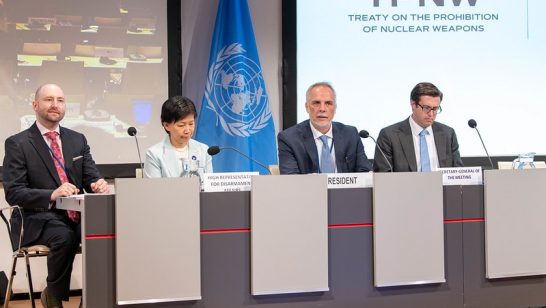
The Austrian government closed the Vienna Conference on the Humanitarian Impact of Nuclear Weapons (HINW) with two unexpected and extraordinary pledges: the first to cooperate with all stakeholders “to identify and pursue effective measures to fill the legal gap for the prohibition and elimination of nuclear weapons,” and the second “to cooperate with all relevant stakeholders, states, international organisations, the International Red Cross and Red Crescent movements, parliamentarians and civil society, in efforts to stigmatise, prohibit and eliminate nuclear weapons in light of their unacceptable humanitarian consequences and associated risks.”
The “Austrian Pledge” means that campaigners for a treaty banning nuclear weapons can now begin the real work of bringing willing states together around a political process to prohibit and eliminate the worst weapons of mass destruction ever created—and the only ones not subject to an explicit prohibition under international law. At least 42 states signalled their readiness to join such a process during the general debate in Vienna on 9 December, and others are likely to do so once an actual process begins to take shape.
The first step defined by Austria will be to bring the conclusions of the three HINW conferences—Oslo, Nayarit, and Vienna—into the 2015 Non-Proliferation Treaty Review Conference (RevCon) next May, and urge the NPT to take up the urgent and long overdue task of fulfilling Article VI as a humanitarian imperative on the basis of those conclusions. In the meantime, civil society representatives, under the framework of the International Campaign to Abolish Nuclear Weapons (ICAN) will be working with as many states as possible to ensure that the process goes forward regardless of the venue.
The Chair’s summary itself is a powerful and persuasive document, spelling out in precise language all of the evidence and key conclusions of the three HINW conferences. And while it reflects the full range of views that were expressed during the discussions about how to deal with this evidence, it also indicates which of those views had substantial support. It specifically states that “many delegations” stressed the need for security for all and underscored that the only way to guarantee this security is through the total elimination of nuclear weapons and their prohibition and that “the majority of delegations” underscored that the final elimination of nuclear weapons should be pursued within an agreed legal framework, including a nuclear weapons convention.
By the end of the conference, more than enough states had taken up ICAN’s call for a legally binding instrument to ban nuclear weapons to make a start down that road. After a short campaigners debriefing at the conclusion of the Conference, we came away confident that “the Austrian Pledge” completes the transition from learning about the humanitarian impact of nuclear weapons to acting upon the evidence and pursuing a ban treaty as the real “game changer” that will deliver a world without nuclear weapons.
The opinions articulated above represent the views of the author(s), and do not necessarily reflect the position of the European Leadership Network or any of its members. The ELN’s aim is to encourage debates that will help develop Europe’s capacity to address the pressing foreign, defence, and security challenges of our time.



